Seeing the Conflict Through a Black Lens
Short Take
Homepage photo: Taliban leaders (Credit: Press Trust of India)
[btnsx id=”5768″]
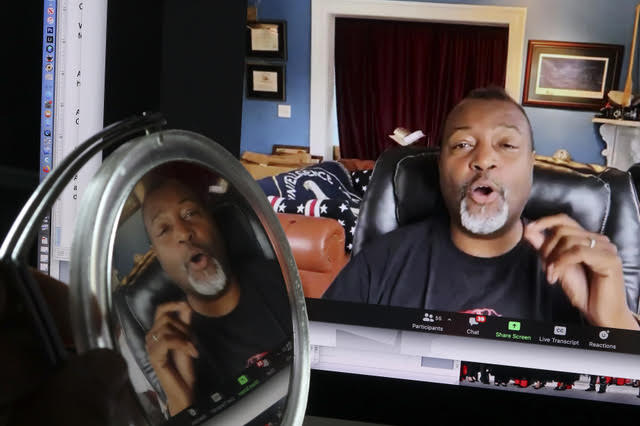
Seeing the Conflict Through a Black Lens
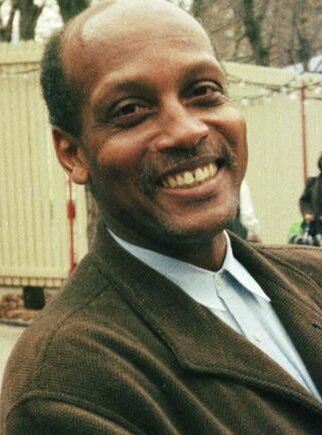 Ozier Muhammad (pictured) was a photojournalist for The New York Times when he went to Afghanistan in 2001 and 2002. “There was a small cadre of my colleagues who had disdain for the Afghan,” he told the Journal-isms Roundtable on Sunday.
Ozier Muhammad (pictured) was a photojournalist for The New York Times when he went to Afghanistan in 2001 and 2002. “There was a small cadre of my colleagues who had disdain for the Afghan,” he told the Journal-isms Roundtable on Sunday.
“Speaking of the interpreters and the support groups, for instance, I heard the word flung around so many times, ‘Rafi, F.U.’ ‘Rafi F,’ ‘Rafi, you’re a dumb M.F.’, to that effect.” Rafi is one of the names of God in Islam.
“And to the Pashtun, the Dari-speaking people . . . the Pashtun people know what that word means, know what it means to say, ‘F.U.,’ or ‘you’re a dumb M.F.,’+ or something like that.”
 Ron Claiborne (pictured), now retired from ABC News, added, speaking of African American journalists, “I think . . . when we cover a situation like this, the U.S. occupying and imposing itself on a foreign country, if there’s any value in having a different perspective, it is that we tend to be able to see it through the lens of ‘The Man,’ ‘The Man’ imposing his will on people who really don’t want them there, and not understanding the culture and history of a place. I certainly — that was my sense of it when I was there, up in the north in late 2001.”
Ron Claiborne (pictured), now retired from ABC News, added, speaking of African American journalists, “I think . . . when we cover a situation like this, the U.S. occupying and imposing itself on a foreign country, if there’s any value in having a different perspective, it is that we tend to be able to see it through the lens of ‘The Man,’ ‘The Man’ imposing his will on people who really don’t want them there, and not understanding the culture and history of a place. I certainly — that was my sense of it when I was there, up in the north in late 2001.”
Malcolm Nance, the former counterintelligence agent who is now an author and chief terrorism analyst for MSNBC, was blunt. The Afghanistan situation is “literally like Vietnam, white people dropping into the middle of that world with no respect,” in contrast to relationships forged by Al Qaeda.
“I’ve said this on air just recently, we have a bigoted, racist attitude toward the world, and I’m saying this as a professional intelligence officer,” Nance told the group. “This is not me, Malcolm Nance, the African American, saying this. You know, if I was a white guy I’d have to say this . . . we’re a bigoted, self-centered culture.”
Nance also said that “most of those people at the gate, who did not work for the United States, are likely economic refugees. They just see a chance to get out on a free plane, out of Afghanistan,” and that because it is a patriarchal society, Western-style women’s rights might not be the priority depicted in the West.
As many as 78 were on the Zoom Journal-isms Roundtable call and 137 more watched on Facebook Live. [Facebook users can watch at < when they were paying attention at all — had been reporting over the last 20 years. [Updated Sept. 4]
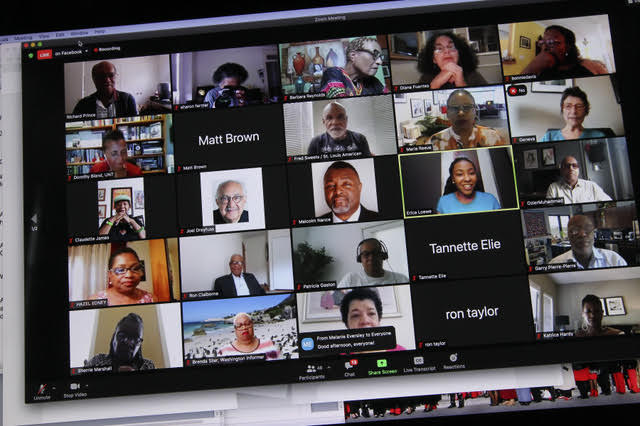
In the middle of the Roundtable, Geneva Overholser, veteran journalist, editor and professor, wrote in the chat room, “Why does it take so long for truth to catch up? That persistent question makes you feel pretty miserable about journalism.”
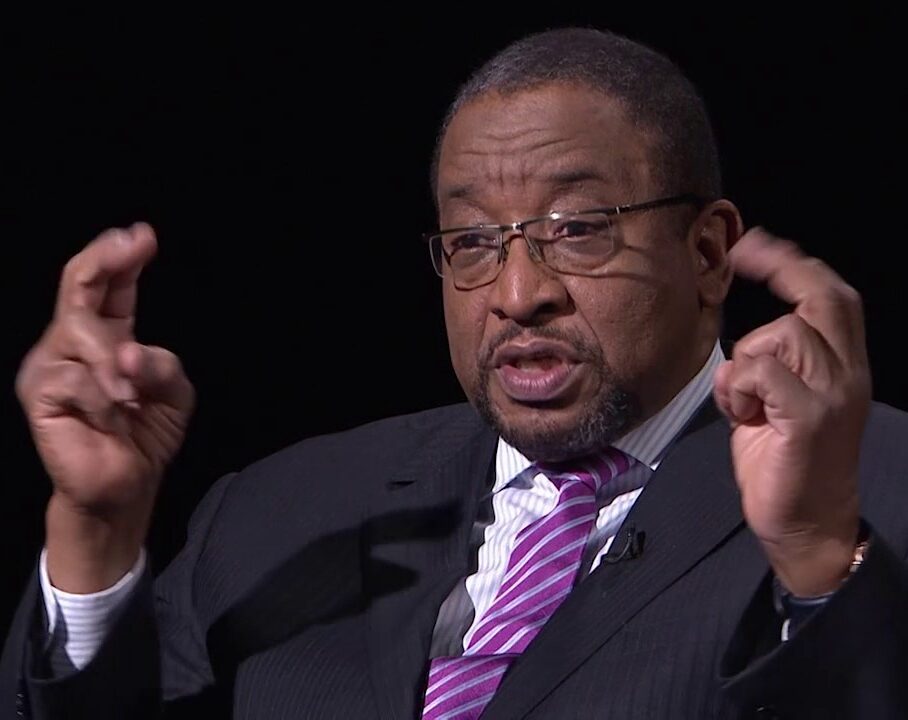 Randall Pinkston (pictured) replied, “Geneva, I think one answer to your question is the people who decide what will be covered move from crisis to crisis… rather than focusing on the history and tribal relationships of the nation… and, of course, the government that controls the sending of our taxpayer dollars is not going to reveal the tons of taxpayer dollars going to American contractors and the Afghans the US chose to pay.”
Randall Pinkston (pictured) replied, “Geneva, I think one answer to your question is the people who decide what will be covered move from crisis to crisis… rather than focusing on the history and tribal relationships of the nation… and, of course, the government that controls the sending of our taxpayer dollars is not going to reveal the tons of taxpayer dollars going to American contractors and the Afghans the US chose to pay.”
As a CBS News correspondent, Pinkston was among about 200 Western journalists who traveled from Peshawar, Pakistan, across the Torkham border into Jalalabad, Afghanistan, in October 2001. Pinkston was also in Tora Bora, the mountainous region where Osama Bin Laden was believed to have hidden.
When President Biden spoke to the nation an hour after the Roundtable, it was as if he and those reporting on the developments were in a parallel universe. Their emphasis contrasted sharply with our panelists’.
The journalists also heard from Maria Reeve and Katrice Hardy, Black women who are the new top editors of the Houston Chronicle and Dallas Morning News, respectively, and from Trey Baker, Biden’s senior adviser for African American outreach/public engagement. Baker outlined Biden initiatives of special interest to African Americans, filling in for Karine Jean-Pierre, deputy White House press secretary, who was called away in preparation for Biden’s speech.
Reeve and Hardy accepted the congratulations and support of Black journalists, particularly women, and discussed how they planned to lead their newsrooms in our changing media environment.
“Just think, when I came into journalism in the 1960’s, having Maria and Katrice heading these news operations were beyond the wildest dreams” of most of us, Barbara Reynolds said in a common sentiment.
Sherrie Marshall, retired executive editor of the Telegraph in Macon, Ga., said she hoped that the two women never allow themselves to fall victim to the “impostor syndrome,” a topic at last week’s conference of the National Association of Black Journalists. It is defined as “the persistent inability to believe that one’s success is deserved or has been legitimately achieved as a result of one’s own efforts or skills.”
Nance said Biden should fire Jake Sullivan, the national security adviser, for his lack of planning, and replace him with retired Lt. Gen. Russel Honoré. Honoré is best known for his role as commander of the task force that was in charge of the U.S. military response to Hurricane Katrina in 2005. He is now leading a review of the U.S. Capitol’s security in the wake of the deadly Jan. 6 attack.
The mishandling of the wars in Afghanistan and Iraq, fueled by arrogance, wasteful spending and ignorance of local cultures, predates Sullivan and goes back to the George W. Bush administration, Nance said. He gave this example:
“When we left Afghanistan and started the invasion, . . . started planning in February 2002. That’s when I got my first contract with Naval Special Warfare and Special Operations Command to start operational planning for an invasion of Iraq, one year before we invaded” in March 2003.
“I was making $10,000 per class every 72 hours to train [Navy] SEALs and special boat squadron people in prisoner handling and Arabic. Right. All for Iraq, Iraqi dialect . . .
“And in the runup to the invasion of Iraq, I was making so much money I felt guilty. And I . . . sent a letter to the secretary of the Navy and the master chief petty officer in the Navy and I said, ‘Look, you’re about to invade the middle of the Middle East, right, Mesopotamia; you need every person that can speak Arabic. I would request respectfully to be brought back on active duty because I’m charging you a boatload of money to do something I could do for free and help you in this invasion.’
“I have a letter which I’m going to frame someday that will be in my memoirs, from the secretary of the Navy, that says, ‘We have no foreseeable requirement for people who speak Arabic.’
“I mean, we’re about to invade a country of 40 million Arabs, and he did not want anyone else who could speak Arabic because he thought like [then-Vice President] Dick Cheney said,” once we liberate the Iraqis they will “join us, and we’ll have all the interpreters we need.
“Why did we have interpreters in Afghanistan and Iraq? Because they would not teach the soldiers, or often the State Department personnel . . . who were rotating through by the thousands in Afghanistan. Even CIA officers weren’t fluent in Dari or Farsi or Pashto or, you know, any other dialects. Oh, they’re not even [learning] Punjabi, right, which is [spoken in] Pakistan, to listen to the ISI,” the Pakistan intelligence services. “None of that.
“We think we’re going to get these people; we wouldn’t have to fly out 15,000 translators. If our Special Forces groups were all trained in Farsi or Dari or Pashto . . . we can feel the culture better.
“We don’t do that, [we’re] the United States of America. Everybody wants to drink Coke, everybody wants to immigrate to the United States.”
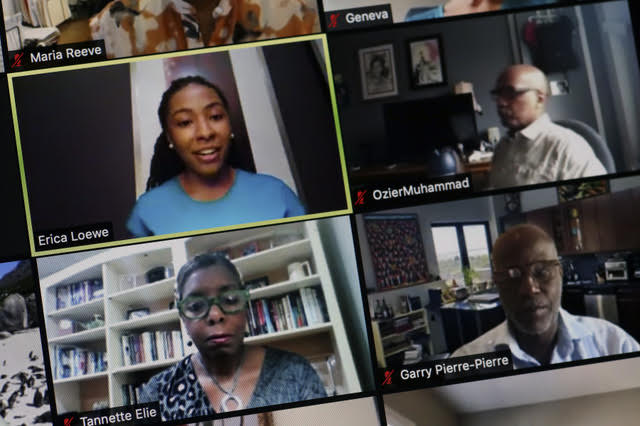
Wrong. As for Afghan soldiers not willing to fight, Nance continued, ‘What I’ve learned — this key point — is they don’t betray us. They make choices within their culture that . . . satisfy them culturally, religiously and benefit their family.” Nance recounted how as a spy he presented himself as a Muslim and sipped tea with an imam in Tora Bora.
“Everything we’ve done, had done there should have been with people who were Muslim Americans or people, you know, local people who were incorruptible. Money takes everything down there, even though — here’s a good example. Even though I was there at the direction of their warlord to get through the checkpoint to Tora Bora, I had to bribe the effing guards with $500 cash. Right.
“And I’m like, they had been so used to being handed handfuls of cash from Fifth Group Special Forces,
that, you know, the U.S. government still gotta pay to go into the village we just bombed. I mean, they saw Afghanistan, on the tribal level, as a money-making opportunity. . . . if you’re a Westerner, you’ll never understand it for your entire life. . . .
“It is a patriarchal, misogynistic, fundamentalist Islamic Society . . . there are religious groups in the United States that are exactly the same. Mormons, right, you know those Mormon cults out west.
“You cannot change that.”
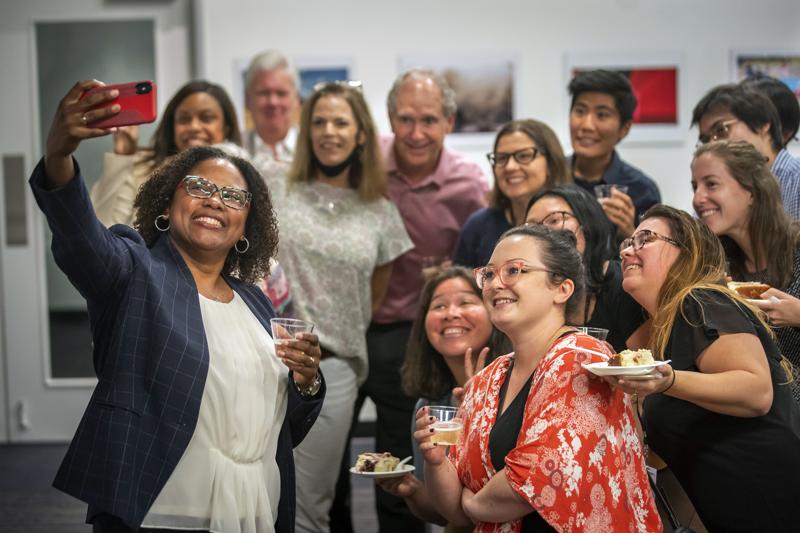
When the subject shifted to the new Texas editors, Reeve, who was managing editor at the Houston Chronicle before her promotion in July, responded to a question about Texas’ status in the news as a locus of anti-vaccine sentiment and a battleground over voter suppression.
“You know, Texas is wild,” Reeve said. “In our news meeting Thursday, that morning I said, ‘Okay, we’ll see what today brings, they told me to stop saying that because that was the night where Dan Patrick,” the lieutenant governor, “went on Fox and said what he said about Black folks driving our numbers here” on COVID infections.
“We also had a Texas Supreme Court ruling that day. It is nonstop, which I like.”
Reeve also said her priority is growing her digital audience and changing a culture in which even younger reporters seek to write “50 inch stories that no one — like no one” is reading.
Hardy, who arrived at the Morning News the week prior from the Indianapolis Star, said she asked all staffers eight questions, to help her determine how the news operation can better use its resources. She has already ended one news meeting that she considered unnecessary. Hardy praised Gannett, where she worked for five years, saying, “There is no more digitally savvy news organization or company. . . . They get it, they understand the audience they’ve invested in in audience research, and that has been a phenomenal . . . learning ground for me.”
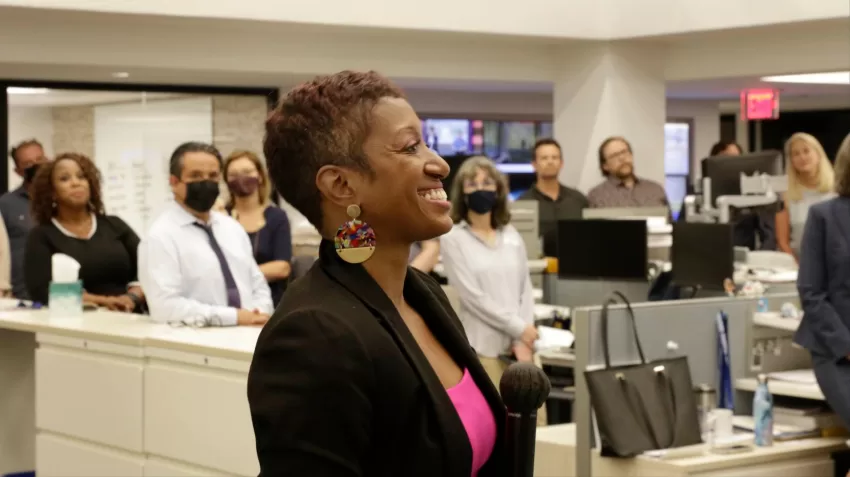
Hardy is chair of the News Leaders Association’s diversity committee. She said that Gannett has provided a playbook. “It was all about transformation, not so much digitally, but on the choices we make to serve our audience and who we were neglecting.”
She also noted the need for better branding of Dallas Morning News product that young people read on social media, and for meeting them on the newer social media platforms. “Civic engagement is a huge issue for many young people when it comes to the environment, when it comes to voting rights. Even when it comes to, frankly, issues around just diversity, because their friends represent so many different segments of the population.”
Erica Loewe, White House director of African American media, was asked whether even having such a position amounted to “segregation.” She replied that “I’d like to believe that I’m here just to make sure that there’s access and that everyone has a seat at the table.”
Peggy Lewis, who held a similar post during the Clinton administration, commended Loewe and Baker because “it is a tough position . . . I was trying to make sure Native Americans (were) at the table, that Hispanic reporters were at the table, so it’s a fight that we continue to see.”
- Jon Allsop, Columbia Journalism Review: Biden, Trump, and the missing big picture in Afghanistan coverage
- Emma Ashford, Washington Post: Buried doubts and public deceptions in the Afghan war (Review of “The Afghanistan Papers: Secret History of the War” by Craig Whitlock)
- Alexis Benveniste, CNN: Western news outlets are working to evacuate local journalists from Afghanistan
- William Brangham with Sarah Chayes, PBS Newshour: The U.S. ignored corruption within the Afghan government. Did that lead to its fall? (video)
- Sarah Chayes, sarahchayes.com: The Ides of August (Aug. 16)
- Committee to Protect Journalists: G-7 must protect and evacuate journalists and media workers in Afghanistan
- Dexter Filkins, New Yorker: What We Left Behind in Afghanistan
- Stephen Grey, Charlotte Greenfield, Devjyot Ghosal, Alasdair Pal and Reade Levinson, Reuters: Reuters photographer was killed after being left behind in retreat, Afghan general says
- Bruce Haring, Deadline: Fox News Rescues Afghan Nationals Who Aided Correspondents
- Julie Hollar, Fairness & Accuracy In Reporting: Media Rediscover Afghan Women Only When US Leaves
- Journal-isms: Journalists Say They Foresaw Tragic Outcome
- Lucas Kunce, Kansas City Star: I served in Afghanistan as a US Marine, twice. Here’s the truth in two sentences
- Paul Mozur and Zia ur-Rehman, New York Times: How the Taliban Turned Social Media Into a Tool for Control
- Press Trust of India: The Taliban: what could its return to power mean for Afghanistan? (July 27)
- Abubakar Siddique, Radio Free Europe/Radio Liberty: The Taliban’s Quest For Legitimacy Faces Mounting Obstacles
- Alice Speri, The Intercept: U.S. Media Organizations Scramble to Get Hundreds of Afghan Colleagues to Safety
- Charlotte Tobitt, Press Gazette, Britain: Some 200 Afghan journalists given right to settle in UK following appeal from media outlets
- Natasha Turak, Abigail Ng and Amanda Macias, CNBC: ‘Intelligence failure of the highest order’ — How Afghanistan fell to the Taliban so quickly
Short Take
- Journal-isms is renewing its search for an assistant editor to work part time, 15 to 20 hours weekly. Please see the “About” section of this website for more information.
[btnsx id=”5768″]
To subscribe at no cost, please send an email to journal-isms+subscribe@groups.io and say who you are.
Facebook users: “Like” “Richard Prince’s Journal-isms” on Facebook.
Follow Richard Prince on Twitter @princeeditor
Richard Prince’s Journal-isms originates from Washington. It began in print before most of us knew what the internet was, and it would like to be referred to as a “column.” Any views expressed in the column are those of the person or organization quoted and not those of any other entity. Send tips, comments and concerns to Richard Prince at journal-isms+owner@
View previous columns (after Feb. 13, 2016).
View previous columns (before Feb. 13, 2016)
- Diversity’s Greatest Hits, 2018 (Jan. 4, 2019)
- Book Notes: Is Taking a Knee Really All That? (Dec. 20, 2018)
- Book Notes: Challenging ’45’ and Proudly Telling the Story (Dec. 18, 2018)
- Book Notes: Get Down With the Legends! (Dec. 11, 2018)
- Journalist Richard Prince w/Joe Madison (Sirius XM, April 18, 2018) (podcast)
- Richard Prince (journalist) (Wikipedia entry)
- February 2018 Podcast: Richard “Dick” Prince on the need for newsroom diversity (Gabriel Greschler, Student Press Law Center, Feb. 26, 2018)
- Diversity’s Greatest Hits, 2017 — Where Will They Take Us in the Year Ahead?
- Book Notes: Best Sellers, Uncovered Treasures, Overlooked History (Dec. 19, 2017)
- An advocate for diversity in the media is still pressing for representation, (Courtland Milloy, Washington Post, Nov. 28, 2017)
- Morgan Global Journalism Review: Journal-isms Journeys On (Aug. 31, 2017)
- Diversity’s Greatest Hits, 2016
- Book Notes: 16 Writers Dish About ‘Chelle,’ the First Lady
- Book Notes: From Coretta to Barack, and in Search of the Godfather
- Journal-isms’ Richard Prince Wants Your Ideas (FishbowlDC, Feb. 26, 2016)
- “JOURNAL-ISMS” IS LATEST TO BEAR BRUNT OF INDUSTRY’S ECONOMIC WOES (Feb. 19, 2016)
- Richard Prince with Charlayne Hunter-Gault,“PBS NewsHour,” “What stagnant diversity means for America’s newsrooms” (Dec. 15, 2015)
- Book Notes: Journalists Follow Their Passions
- Book Notes: Journalists Who Rocked Their World
- Book Notes: Hands Up! Read This!
- Book Notes: New Cosby Bio Looks Like a Best-Seller
- Journo-diversity advocate turns attention to Ezra Klein project (Erik Wemple, Washington Post, March 5, 2014)
When you shop @AmazonSmile, Amazon will make a donation to Journal-Isms Inc. https://t.co/OFkE3Gu0eK
— Richard Prince (@princeeditor) March 16, 2018
![]()

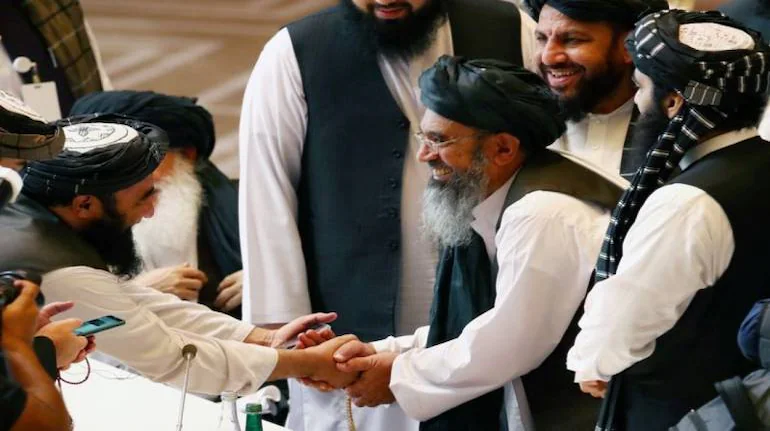
8 comments